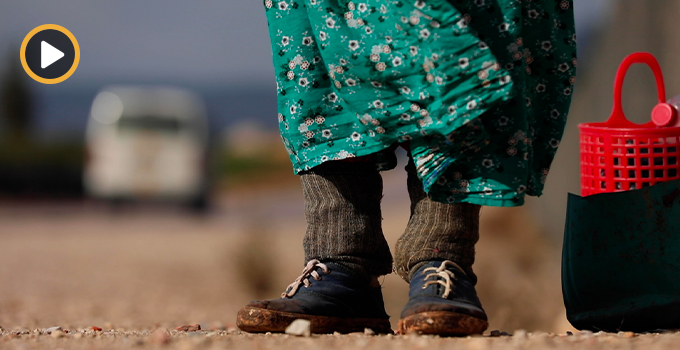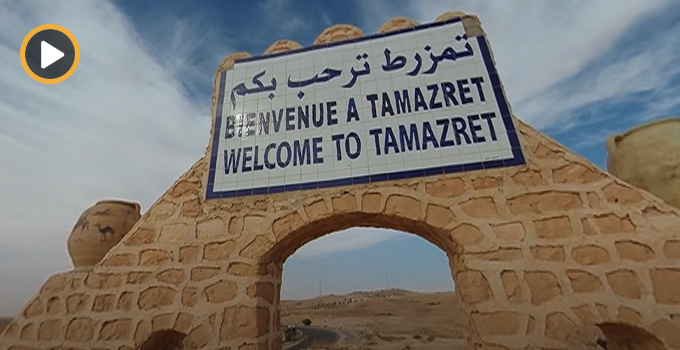
Gafsa. Too far south to catch our interest, too central to attract tourists. The capital of the mining sector is painful to behold. The skies are leaden and the ambiance is sad. A small gathering of job-seekers looking for work in the city center bears witness to ongoing tensions and demands that are far from being met. Among the forsaken are Amor and his family. He and his brothers tell of their past, their present, and their dreams for the future. Hearing the stories echos throughout this family is eye-opening, revealing the human experience’s different faces, fleshing out each identity, and magnifying differences.
In order to reach Amor, one must leave the city and follow a road that leads toward Gabès. Barely 13 kilometers from Gafsa, a visitor gets the impression that he is lost in a no man’s land. This is Mdhilla, a sleepy town whose inhabitants die of hunger, of sickness, and most often, of both.
Entering the town, one finds a building belonging to the Phosphate Company of Gafsa in the middle of a field. Photography forbidden, announces a sign. The dust covering the sign allows me to pretend that I haven’t seen it. Forbidden to take photographs of what? The steel skeleton in front of me? The reservoir that claims to be a security measure in case of a problem? Or the unknown substances billowing from the chimney?

Looking at Amor, a young man who is 29, I tell myself that he shouldn’t be so intoxicated. His teeth are still white, which practically constitutes a miracle in these parts.
I met Amor in Tunis at the beginning of December. He was part of a sit-in in front of the Constituent Assembly, come to demand equality, the rule of law, and dignity. “I came to remind the deputies that they made promises and we’re waiting for results. We’re watching.”
Amor doesn’t work in the mining industry. He seems to be the dreamer out of his brothers. Someone needs to be. His good looks and volubility lends themselves to the tourist trade. “But nothing steady, I just take jobs when there are groups coming through.” That morning his eyes were drooping with fatigue. At 4 in the morning, he accompanied a group of tourists to watch the sunrise over the salt lake. “Usually, I organize rallies in the desert, but that’s not working at the moment.” Working in the mine is not for him. Never the less, he reports he’s found a fiancee from Northern France. “You know, mining people, like from the North of France, they live like us: it’s all about family, it’s powerful” he says, clasping his hands.
So is family what keeps them going? His brother Abdelkhader doesn’t seem very sure what keeps him going. It’s noon and he is barely awake. He does work in the mine. He’s the pragmatic one in the family. “I studied to be an auto mechanic. I knew I would end up in the mine. Tourism doesn’t mean anything to me.” Breaking into peals of laughter he whispers that tourism appeals to him as a vacationer, not a worker.”
But who knows when he’ll be able to afford to spend the night at a hotel. At 28, he has eight years of mining behind him. In the beginning it was for a sub-contractor. And then the company was taken over by the state. For a moment, he believed it might bring him some stability. He was disappointed. He would have to wait a while longer. For years he earned a pittance “150 or 200 dinars, but since the Revolution, I have a real contract with the CNSS and I earn 700 dinars. It’s better.”
The working conditions are still awful. “I’m a truck driver in the phosphate wash station. For a seven hour shift, I only work 30 minutes or an hour at most. After that, I need to rest. It’s too tiring and there’s too much dust.”

Despite having gotten a contract, he doesn’t feel as though things are faire. The system hasn’t changed, corruption is still rampant, he confirms, but he is afraid to leave. “Now the bosses know we can halt production, block the trains, the trucks, the deliveries. They are wary now.”
“Before, you had to buy your spot, pay 20,000 dinars or have a connection, either in the union or the management.” And if his situation has improved, the same is not true for everyone. “We’re still on the alert because there is still a lack of job security here.” And the first person on his mind is his little brother Abdallah, in Tunis since November, trying to make his voice heard.
Mdallah, their mother, watches and listens. From her plastic chair in the corner of the big empty room, she finally speaks. “ Living conditions are difficult. They made a promise to hire two people from large families in need. But it didn’t happen. The same corruption is still there. The system is still unfair.” She’s tired of waiting, of seeing her children wander aimlessly, and she wants to find a way out, and put these years of misery behind her.
“If the authorities really wanted to fix things, they would come here and examine our cases individually. But there’s no desire to change. When the Revolution happened, we thanked God because we thought the sky, which had been dark for so long, was going to clear. But it never did.”

When Amor and his brother Abdallah left for Tunis to participate in the sit-in, Mdallah didn’t expect them to come back any time soon. Abdallah, one of Mdallah’s seven sons, has been camped out in front of the Tunisian Chemical Group’s headquarters since November 25th. He is 24 years old, and has long ago left school behind him. “I did a soldering training program so I could work in the factory. I got into the Chemical Group, but I didn’t get what I deserved, so I left.” He tried his luck at the entrance exam for the Gafsa Phosphate Company, but, like so many others, he did not pass. “I’m staying in Tunis until they give me a job or until they explain why I didn’t get one, and what makes other people more competent than I am.”
Abdallah is the rebel in the family. He speaks with a clenched jaw and his eyes are burning with rage. “The only solution is to leave. If I have to go to Lampedusa, I will, even if it means I end up at the bottom of the ocean. In any case, I’m already dying inside, little by little. I’m dying here and my mother is suffering at home, so it would be better to put an end to it once and for all.” And when he had finished, I thought of his mother’s face, when she looked at Dallel, her youngest son, and said: “When I see my son, who is almost 30 years old, leave the house without a single dinar in his pocket, who can’t even buy a cigarette, it breaks my heart. And sometimes I feel guilty that I brought them into this world.”

“Marzouki and Jebali need to think about the distress of the poorest people. All Tunisians need to understand that we are all facing the same obstacles. We want to live a decent life.” Mdallah wants a decent life, where she doesn’t need to stretch the 375 dinars of her husband’s pension to care for her 10 children. Each child’s dreams fit his personality. The pragmatic one wants a job. The rebel wants to leave and start over. And the dreamer would be happy with love: a wedding and a little daughter are all Amor wants.
“Sometimes I cry , I ask myself if someday my children will get married, if I’ll ever have grandchildren. My oldest child is 30, and he is barely getting by, it causes me great pain,” explains Mdallah.
Amor has not lost hope. He doesn’t want to give in to the diktat that leaves no alternative but working in a factory in this abandoned region. He wants to put together a hot air balloon club, or buy dromedaries to take tourists on rides. But the authorization is a long time coming and money is short. “If you’re broke, the only thing you can do is dream. So I dream. Maybe it’s because the Revolution hasn’t made its way to us yet.”
- Original post in French by Frida Fado: Gafsa : Là où la Révolution n’est pas encore arrivée.
- Translated into English by Edith Mulhern.





iThere are no comments
Add yours